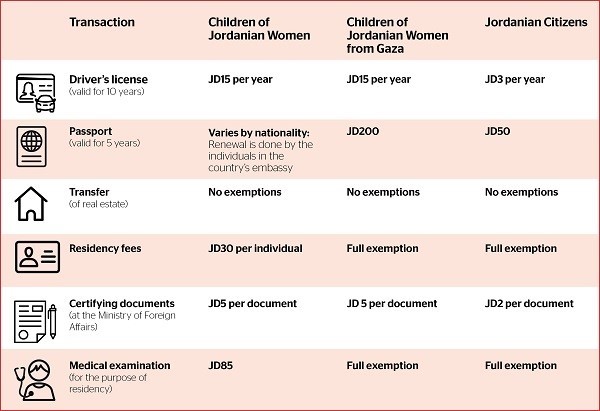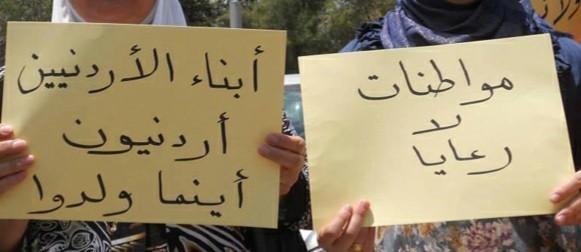AMMAN — Questions came to the mind of 19-year-old Ayham
when the cashier at the
Traffic Department in Amman asked him to pay JD154 for
a Jordanian driver’s license.
اضافة اعلان
He only had JD38,
since this was the fee his friend paid recently when he applied for his driving
license.
“How is my friend
different from me?” asked Ayham. “He and I were born the same year in Amman,
and we speak the same dialect. We sang the national anthem and saluted the flag
together at the same school.”
Ayham sighed as
he asked the cashier for the required amount again. His response was, “Sorry
but you are not Jordanian”.
Ayham replied “I
am the son of a Jordanian woman,” to which the cashier at the window responded
“they are not (considered) Jordanian citizens.”
Jordanian women’s
children who reside in the kingdom pay higher fees than citizens when they
request or certify official documents, or when they renew their driver’s
licenses.
Ayham’s case is
similar to 21-year-old Mohammad, who travelled abroad to complete his
education. Once back, he approached the Ministry of Foreign Affairs and
Expatriates to certify his degree. This was possible for a fee of JD5, whereas
Jordanian citizens pay only JD2
“We are being
treated as foreigners,” a frustrated Mohammad said.
There is no
recent data on the number of children to Jordanian mothers. But in 2014, the
Jordanian Ministry of Interior said that there were more than 355,000
non-Jordanians whose mothers were Jordanian citizens.
A report by the New
York-headquartered
Human Rights Watch said that those individuals usually
endure hardship in accessing basic rights and services. It said the authorities
also restrict their right to work, to own property, and to travel. They also
have limited access to public-funded education and healthcare.

The hardships
drove Jordanian mothers, who are married to foreigners, to stage protests and
sit-ins to draw attention to the discrimination against their children. This
included a campaign called “My Mother is Jordanian” and the coalition of “My
Right, My Family!”
Consequently, the
Cabinet said in 2014 that it was easing the restrictions by granting children
of Jordanian women some privileges.
But the
discretionary treatment was limited and did not meet the aspirations of the
children of Jordanian women, said Rami Al-Wakil, the coordinator of the “My
Mother is Jordanian” campaign.
“The privileges
and leeway are limited to certain areas and are not comprehensive. For example,
they are treated like Jordanians in primary and secondary education,” he
said. “When it comes to university
education, only 150 seats in public universities are reserved for the children
of Jordanian women on a competitive basis, while the rest are registered as
foreigners through the Parallel system.”

“In healthcare, children of Jordanian women up
to the age of 18 years are treated like Jordanians, but after that age, they
are treated as foreigners,” he added.
Human rights
activist Inaam Al-Asha said “Children of Jordanian women were given the ‘Package
of Citizenship Rights for Children of Jordanian Women’. This includes the right
to residency, work, education, and medical care, but not the right to political
participation.”
She said the
government move was a step towards reducing the hardships and difficulties
faced by the children of Jordanian women.
Is discriminating against children of Jordanian
mothers a constitutional violation?
Discrimination against the children of Jordanian women married to
foreigners happens despite the fact that the constitution guarantees their
mothers the right to equal treatment. Article (6) states, “Jordanians are equal
before the law, and there shall be no discrimination among them in rights or
duties regardless of their race, language or religion.”
The Jordanian
National Charter also stressed this right. It stated: “Jordanian men and women
are equal before the law; there shall be no discrimination among them in rights
or duties regardless of their race, language or religion.”
Some
constitutional amendments also went into force with the publication of the 2022
draft amendment to the Jordanian Constitution in the Official Gazette, issue
number 5,770.
The 14th
amendment to the
Jordanian Constitution of 1952 covered 25 articles in addition
to including the phrase “Jordanian women” in the title of Chapter Two of the
constitution. It was approved by the Senate and members of the Lower House of
Parliament.
Despite the
guarantees under the law, children of Jordanian women continue to suffer from
the discrimination of the law against their mothers, which deny them access to
basic services and opportunities, like other Jordanians.
Al-Asha, the
lawyer, said that “the constitution ranks top in the legal hierarchy. Other
laws, therefore, rank lower on the scale, and they cannot contradict the text
of the constitution.”
“However, this
constitutional amendment rendered the text at odds with the constitution, and
any such texts containing discriminatory language showing bias or inequality
among Jordanian men and women must be reconsidered,” she said.
Earlier this
year, the
Lower House of Parliament agreed to add the phrase “Jordanian women”
to the title of Chapter Two of the constitution, so that this title would
become “The Rights and Duties of Jordanian Men and Women.”
Citizenship maybe the answer to ending
discrimination
Human rights consultant
Riyadh Al-Suboh said that the solution lies in granting citizenship to the
children of Jordanian women, so they can enjoy all civil and political rights.
“The issue of the children of Jordanian women
is often discussed as a political and social matter, and is not seen from its
human rights perspective,” he said.
Asha said that
“civil society organizations are hoping that the amendment to the constitution
would warrant a reconsideration of the Jordanian citizenship law, as nothing
guarantees the rights and determines the duties like citizenship does, as it
seals the bond and regulates the relationship between a person and the country
in which he lived and grew up.”
Until a solution
that does justice to this category of people materializes, Ayham and other
children of Jordanian women married to foreigners continue to live in a country
they consider home, but are frustrated when they encounter discriminatory
situations.
“We are residents
of this country. We are citizens by emotional belonging, but not on official
papers,” Ayham said.
This story was previously published by ARIJ.
Read more Features
Jordan News



